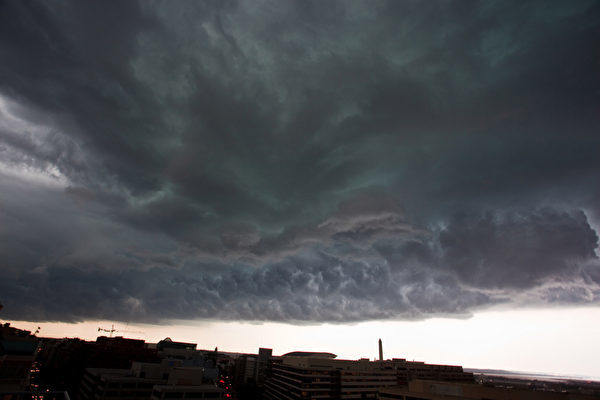The Chinese Communist Party (CCP) is deeply mired in debt, with its money-grabbing efforts continuing unabated. Its collapse may not be far off. (Jeff Nenarella/Dajiyuan)
[People News] By 2024, the CCP faces towering debts, including national debt, local government debt, corporate debt, non-financial corporate debt, and financial system debt—each reaching staggering levels.
Between October 18 and 20, 2024, the Beijing Financial Street Forum was held. Li Jianjun, Vice President of the Central University of Finance and Economics, delivered a report at the forum, stating:
How large is China’s debt? As of June 30, 2024, local government debt officially stood at 42.23 trillion yuan, with implicit urban investment bond debt reaching 57.16 trillion yuan. Combined, this totals nearly 100 trillion yuan—specifically 99.39 trillion yuan. Adding the central government's national debt of 30 trillion yuan brings total liabilities to over 100% of 2023’s GDP of 126 trillion yuan, far exceeding the international warning line of 60%.
According to Ministry of Finance data, from January to July 2024, out of 31 provincial-level administrative regions, only Shanghai recorded a surplus of 70.3 billion yuan, while all other provinces operated at a deficit. Among them: 23 provinces faced fiscal gaps exceeding 100 billion yuan. 15 provinces had deficits surpassing 200 billion yuan. Four provinces experienced deficits exceeding 300 billion yuan, with Sichuan leading at 413 billion yuan.
If we liken China to a company operated by the CCP, this company is teetering on the edge of bankruptcy, with cries of financial shortage everywhere.
What to do? The CCP has no new tricks up its sleeve, relying instead on its historical "seize wealth and divide land" approach—albeit with some new terminology. Here are the six main strategies:
First: Collecting Taxes from 30 Years Ago
According to Chinese media reports, numerous cases have surfaced where companies are being retroactively taxed for activities dating back decades: Hubei Zhijiang Distillery Co., Ltd. was ordered to pay over 85 million yuan in back taxes. A defunct New World Hotel in Foshan, Guangdong, was retroactively taxed 930,000 yuan for 25 years of arrears and late fees. Huizhou Taiji Group faced retroactive taxation of over 53.04 million yuan for 20 years. Tibet-based Qinghai Zangge Mining was ordered to pay 188 million yuan in taxes and late fees for a 20-year period. A prominent real estate developer in Yueyang, Hunan, was hit with retroactive taxes and fines exceeding 900 million yuan for 20 years.
As these cases multiply across China, a Southern Metropolis Daily report from June revealed that at least 20 provinces, including Shanxi, Guangdong, and Xinjiang, have established "police-tax joint operations centers." Most of these centers are based in public security bureaus, while a few are in tax offices.
However, the integration of policing and taxation raises questions. These are distinct government departments with different roles, responsibilities, and powers. How do police and tax authorities "merge"? Does this mean combining legal enforcement with economic measures? Who are they "fighting"? Taxpayers or actual criminals? Does "combat" involve campaigns or coercion?
The CCP often relies on its "guns" (military) and "blades" (security apparatus) to maintain pressure on the Chinese populace. The so-called "police-tax joint operations centers" represent a shift, using these tools against taxpayers. The authorities investigate at their discretion, enforce tax payments, and compel compliance through intimidation or force.
Second: Issuing Bonds Payable in 50 Years
On May 14, 2024, the Ministry of Finance issued 50-year special long-term national bonds totaling 35 billion yuan through competitive bidding. These bonds pay interest semiannually, with the principal and final interest payment due on June 15, 2074.
Who buys these bonds?
-
Central Bank and Commercial Banks: The central bank prints money to purchase these bonds, then offers low-interest funds to commercial banks. Commercial banks, in turn, invest in these bonds to profit from the interest rate spread. This means the bulk of the money raised by these bonds does not flow into the real economy. Instead, this financial maneuvering ultimately leaves ordinary Chinese taxpayers responsible for repaying the debt.
-
Individual Savings: Ordinary citizens are encouraged to use their savings to purchase these bonds. However, given the CCP's unprecedented crises, its longevity is uncertain. Will the CCP even exist in 50 years? If it collapses soon, won't these bonds become worthless, leaving citizens defrauded?
Third: Collecting 4 Trillion Yuan in Fees
According to the Ministry of Finance, non-tax revenue in the first 11 months of 2024 reached approximately 3.7 trillion yuan, a year-on-year increase of 17%. This amount already surpasses the total non-tax revenue of 3.566 trillion yuan collected in 2023. In October and November alone, non-tax revenue grew at a staggering 40%, marking the highest growth rates in recent years and reflecting rampant fines and confiscations across the country.
Historical Trends in Non-Tax Revenue: Before 2010: National non-tax revenue was just under 1 trillion yuan. 2014: It exceeded 2 trillion yuan. 2016: Reached 2.9 trillion yuan. After a slight decline, it surged to 3.24 trillion yuan in 2019, breaking the 3 trillion yuan barrier. During the COVID-19 pandemic (2020-2021), non-tax revenue dropped below 3 trillion yuan but rebounded in 2022. By the end of 2024, it is expected to surpass 4 trillion yuan.
From 1 trillion yuan in 2010 to 4 trillion yuan in 2024—a threefold increase in just 13 years—non-tax revenue growth has far outpaced GDP, fiscal revenue, and household income growth.
As tax revenues fall short, the government resorts to various means, such as fines, confiscations, and revenue-generation schemes, relentlessly squeezing ordinary citizens to make up for the shortfall.
Fourth: Squeezing Corrupt Officials for Their Wealth
In 2024, the CCP intensified its anti-corruption campaign, not only targeting political rivals but also likely aiming to extract wealth from corrupt officials.
This year saw two historical records in the anti-corruption campaign: 1. High-ranking officials: Investigations were launched against 58 provincial- and ministerial-level officials, as well as other top officials. 2. "Billionaire" corruption cases: A record 37 officials accused of embezzling over 1 billion yuan each were prosecuted.
The top ten "billionaire corrupt officials" were: 1. Li Jianping: Former Party Secretary of the Hohhot Economic and Technological Development Zone, Inner Mongolia, involved in over 3 billion yuan in corruption. 2. Bai Tianhui: Former General Manager of China Huarong International Holdings, took 1.108 billion yuan in bribes. 3. Zhang Changgong: Former Secretary of Guangdong Huaxing Bank, misappropriated nearly 1 billion yuan. 4. He Zehua: Former Deputy Director of the State Tobacco Monopoly Administration, accepted 943 million yuan in bribes. 5. Sun Zhigang: Former Party Secretary of Guizhou Province, took 813 million yuan in bribes. 6. Liu Wenxin: Former Deputy Secretary of the Guizhou Provincial Political and Legal Affairs Commission, accepted 609 million yuan in bribes. 7. Wang Dawei: Former Deputy Governor and Public Security Chief of Liaoning Province, received 555 million yuan in bribes. 8. Ji Binchang: Former Chairman of the Qingdao Municipal People’s Political Consultative Conference, took 526 million yuan in bribes. 9. Tian Huiyu: Former President of China Merchants Bank, accepted 210 million yuan in bribes and made illegal gains of over 290 million yuan through insider trading and undisclosed transactions. 10. Li Zaiyong: Former Vice Chairman of the Guizhou Provincial People’s Political Consultative Conference, took 432 million yuan in bribes.
These ten officials alone were involved in a combined total of 9.5 billion yuan. These figures reflect only the amounts confirmed by courts, suggesting the actual sums may be even higher.
Fifth: "Distant Trawling" to Seize Private Wealth
The term "distant trawling" refers to law enforcement agencies in China targeting private companies and individuals outside their jurisdictions to confiscate assets. This practice is driven by financial incentives and involves cross-provincial arrests, asset seizures, and account freezes.
According to a Financial Times report on December 28, 2024, over 80 senior executives from companies listed on the Shanghai and Shenzhen stock exchanges were detained by police in various provinces this year.
A report titled Guangdong Situation Report circulated publicly in October 2024, revealing that cities like Guangzhou, Shenzhen, and Dongguan in the Pearl River Delta had become hotspots for such cross-jurisdictional actions. For example, since 2023, nearly 10,000 private companies, including Pupu, Yijiankang, and Jiujun, have been targeted in Guangzhou alone.
On November 8, 2023, police from the New Barag Left Banner Public Security Bureau in Hulunbuir, Inner Mongolia, traveled to Beijing and detained Xing Yanjun, the general manager of Youyou Interactive (Beijing) Technology Company, along with 14 employees, on charges of "operating a gambling establishment." The company's accounts were also frozen.
Xing Yanjun's partners and family argued that the entertainment model of the involved gaming product did not meet the legal criteria for operating a gambling establishment.
In December 2023, the local prosecutor's office decided not to approve the arrests due to "insufficient evidence." However, the local public security bureau persisted in subjecting Xing Yanjun to designated residential surveillance, continuing his detention.
On April 3, 2024, Xing Yanjun died under suspicious circumstances in the designated residential surveillance facility. In December 2024, the case was withdrawn by the public security authorities, citing "no criminal facts."
On October 30, 2024, Sina Finance published an article titled Distant Trawling Becomes Rampant—Why Are Local Governments Acting So Crazily? The article stated, "Distant trawling has existed for a long time; the issue becomes more pronounced under significant fiscal pressure."
"Distant trawling" is a roundabout term that, plainly speaking, refers to certain law enforcement agencies engaging in cross-jurisdictional "looting" of private enterprises and individual businesses.
Sixth: Foreign Exchange "Investment Losses" and "Errors and Omissions"
According to political commentator Zhao Liang, in his article Revisiting Foreign Exchange—China’s Unchanging Reserves, despite China's citizens generating annual foreign exchange earnings of several hundred billion dollars through hard work and frugality, the nation’s foreign exchange reserves have remained at around $3 trillion.
Examining China’s balance of payments from 2016 to 2023, Zhao concluded: On average, $170 billion annually was lost due to "investment losses." Another $160 billion annually was attributed to "errors and omissions." To balance the books, tens of billions of dollars from state reserves were used each year.
For 2024, with goods trade projected to approach $1 trillion, Zhao predicts that much of the surplus will again disappear under the pretexts of "investment losses" or "errors and omissions."
While these terms are opaque to the average Chinese citizen, they ultimately amount to the CCP covertly and overtly seizing the immense wealth created by the people.
Conclusion
Why has China’s fiscal situation deteriorated after 46 years of "reform and opening up"?
One major reason is the CCP's relentless persecution of Falun Gong practitioners since July 20, 1999.
Over the past 25 years, the CCP has poured billions—possibly trillions—of yuan into suppressing these individuals, who live by the principles of "Truthfulness, Compassion, and Forbearance."
This ongoing persecution drains massive resources daily, monthly, and annually, trapping the CCP in a vicious cycle of financial shortfalls and increasingly desperate money-grabbing tactics.
As the CCP piles up debt and intensifies its plundering, its collapse may not be far off.
(Dajiyuan)











News magazine bootstrap themes!
I like this themes, fast loading and look profesional
Thank you Carlos!
You're welcome!
Please support me with give positive rating!
Yes Sure!